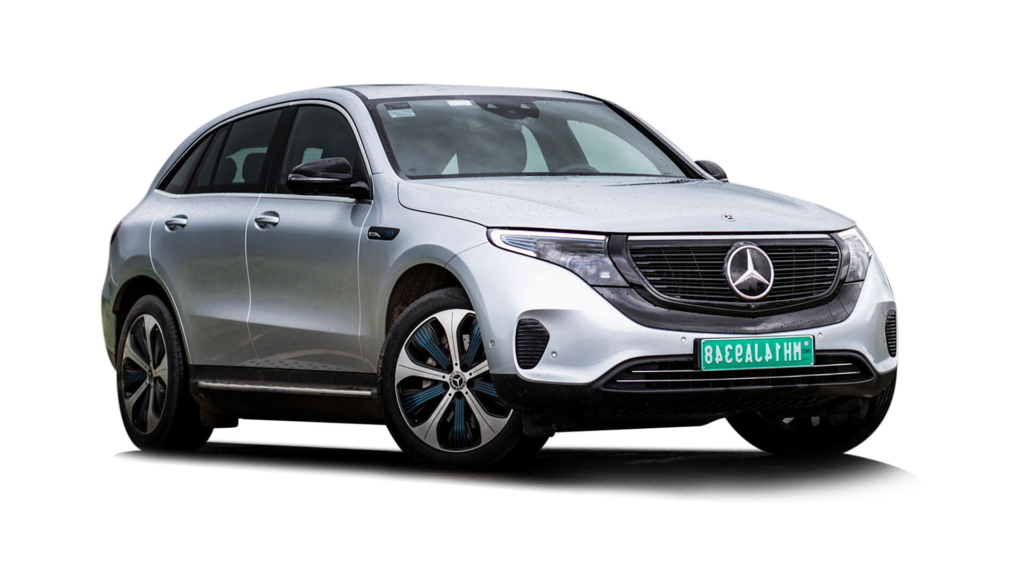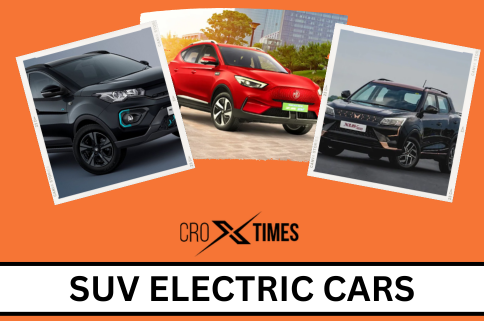Electric Vehicles are winning the hearts of all car lovers and enthusiasts and they are now well familiar with the capability of electric vehicles.
And if you are someone who is looking for performance packed electric vehicles then how can we forget about SUV Electric Cars? Yes, there are various SUV Electric cars in India that you can opt to ease financial burden and enjoy the luxury and comfort that Best SUV Electric Cars in India brings to the table.
In this blog prepared by experts at the CROX Times we are going to explore the best SUV Electric cars as well as the Upcoming SUV Electric Cars in India and other major aspects. Just tighten up your seat belts and let’s dive into the world of electric vehicles.
7 Best SUV Electric Cars
Tata Nexon SUV EV Prime

The all new electric version of TATA Nexon, the TATA Nexon Prime is undoubtedly the most successful electric vehicle in the country. The car covers almost 74 percent of the EV sales in India.
Featuring a lengthy list such as spacious interiors, 5-star GNCAP safety rating and a range of 312km making the TATA Nexon a very comfortable ride and reassuring electric compact SUV. And what’s more, it has been more than 2 years, it has testified as the most valuable EV in Indian Market and this car had certainly accelerated the growth of EV Adoption in India.
Key Features of TATA Nexon Prime SUV
- 7.0-inch touchscreen infotainment system
- Auto Headlamps
- Sunroof
- Semi-digital Instrument cluster
- Cruise Control
- Automatic Climate Control
- Cornering Stability Control
- Dual Front Airbags
TATA Nexon SUV EV Max

Building the success of the TATA Nexon EV, TATA rolled TATA Nexon EV Max which is more capable than any other its electric vehicle. This is packed with bigger battery 40.5kwh as compared to the standard version TATA Nexon EV Max not only has an extended range of 437kms but also features many additional premium features such as wireless charging etc. It also additional safety features such as standard Nexon EV, electronic parking brake with auto hold function, tyre pressure monitoring system and rear disc brakes. From next year, there are upcoming SUV Electric cars from the brand which would surely dominate the electric market.
Key Features of TATA Nexon EV SUV
- 7.0-inch touchscreen infotainment system
- Auto headlamps
- Cruise Control
- Dual Front Airbags
- Air Purifier
- Wireless Phone Charger
- Ventilated Front Seats
- Electronic Parking brake
- All-wheel disc brakes
- Tyre Pressure Monitoring System
- Roll-over mitigation
Read- Best SUV CNG Cars
Mahindra XUV400 SUV EV

The Mahindra XUV400 EV is the first electric SUV from Mahindra with variants like eVertio, e20, and e20. The electric SUV is based on the Mahindra XUV300 with the same engine model. The sports cabin of the XUV brings more comfort and convenience. The XUV 400 claimed of 456km is 4 Km more than Hyundai’s Kona and MG ZS, while both cars are priced higher than XUV400.
Key Features of Mahindra XUV 400 SUV
- 7.0-inch touchscreen infotainment system
- Single Pane Sunroof
- Cruise Control
- Over-the air updates
- LED Daytime Running Lamps
- Six Airbags
- Disc brakes for all four wheels
Check- SUV Cars With Sunroofs
MG ZS SUV EV

The MG ZS EV is second generation and comes with multiple features to make it good choice under 30 lakh. The company claimed a range of 461km and host of features, the MG ZS EV itself a great pic for a family car.
Key Features of MG ZS EV SUV
- 10.1-inch infotainment system
- 7-inch digital driver’s display
- Panoramic Sunroof
- Connected Car Tech
- Six Airbags
- ABS with EBD
- Electronic Stability Control
- Rear AC Vents
Check- Best SUV Car Under 20 Lakhs
Mercedes-Benz SUV EQC

With Mercedes-Benz EQC, the German luxury car manufacturers reached the EV Space of India before anyone else. Based on familiar Mercedes GLC, the EQC features the platform and draws from a 80kwh battery pack placed between the wheels.
Following the tradition of Mercedes, the EQC delivers a refined driving experience with amazing noise insulation which is taken care by double-glazed windows and rubber mounts for the motor.
The cabin packs similar and comfort as the GLC and it strikes a perfect balance between traditional Mercedes and modern EV aesthetics. In this driving experience, the drive is smooth and relaxing while also allowing to enjoy speed traction of 0.1 to 100 km/hr in just 5.1 Seconds.
Key Features of Mercedes Benz EQC SUV
Two 12.3 Touch Screen with MBUX Infotainment system
Touchpads on the steering wheels
Ambient Lightening
Three-Zone Climate Control
Head-up display
Check-7 Seater Hybrid SUV Car
BMW SUV IX EV

The Flagship of the German Luxury Carmaker, the BMW IX arrived in 2021. This is brand’s first EV has been given its absolute focus and loaded with everything especially if we talk about tech goodies, electrochromic panoramic Single Glass roof, 18-speaker Harmon Kardon Sound system powered by 655 amplifier and massage function front seats if we name a few. The long wheelbase of around 3000mm makes the rear space feel like a tech laden lounge. And the driving experience is remarkable which is associated with the name “BMW”
Key Features of BMW IX EV SUV
- 12.3-inch digital driver’s display
- 14.9 Inch digital infotainment system
- 5G Mobile connectivity
- Head-up display
- Panoramic Sunroof
- Surround View Camera
- 4-Zone Climate Control
- Upto 8 Airbags
- Blind Spot detection
- Front Collision Warning
Jaguar I Pace

As the name of the Company says it all, Jaguar I pace is built for good performance. And this monster can cover 0 to 100 km/her in just 4.8 seconds. The spectacular 5-seater SUV manages in making driving quite engaging and smooth while keeping all the wheels under control. Contrary to what we see from outside, the rear seat has ample of space making it comfortable for the passengers at the back. In addition to that, companies claim to provide a range of 470km making it perfect ride for daily commutes and short trips with your family and friends.
Key Features of Jaguar I Pace
- 10.inch touchscreen infotainment system
- Dual Climate Control
- Upto Six airbags
- Lane-keep assist
- Front and rear parking senors
SUVs: The Preferred Choice
The SUV segment has long been popular in India, owing to its versatile appeal, spacious interiors, and robust performance on diverse terrains. The introduction of SUV electric cars has further expanded the horizons of this segment, combining the best of both worlds – the power and comfort of an SUV with the eco-friendliness of electric propulsion.
Environmental Benefits: One of the primary reasons behind the surge in SUV electric car adoption is their positive impact on the environment. These vehicles produce zero tailpipe emissions, significantly reducing air pollution and contributing to cleaner air quality in India’s bustling cities.
Cost Savings: While the initial purchase cost of SUV electric cars may be higher than their conventional counterparts, the operational costs are considerably lower. With electricity being cheaper than gasoline and diesel, EV owners can enjoy substantial savings on fuel expenses over time.
Government Incentives: The Indian government has been proactive in promoting EV adoption through various incentives and subsidies. Reduced GST rates, lower road taxes, and income tax benefits have made SUV electric cars more financially appealing to consumers.
Technological Advancements: Rapid advancements in battery technology have addressed range anxiety concerns and improved the overall performance of SUV electric cars. With longer driving ranges and faster charging times, these vehicles are becoming increasingly practical for everyday use.
Charging Infrastructure: The growth of charging infrastructure across India has been pivotal in encouraging the adoption of electric vehicles. Charging stations are becoming more accessible, especially in urban areas, making it convenient for SUV electric car owners to charge their vehicles.
Challenges and the Road Ahead
Despite the promising trajectory of SUV electric cars in India, a few challenges persist:
Infrastructure Development: While the charging infrastructure is improving, it is still not as widespread as needed. Strengthening the charging network across highways, cities, and remote areas will be crucial to boost the confidence of potential buyers.
Initial Costs: The upfront cost of SUV electric cars remains a significant barrier for many consumers. Continued efforts to bring down the cost of EV components and batteries could make these vehicles more affordable.
Consumer Awareness: Educating consumers about the benefits of SUV electric cars and dispelling myths about their limitations, such as range anxiety, is essential for wider adoption.
Conclusion
The rise of SUV electric cars in India marks a promising step towards a cleaner and greener automotive landscape. With their combination of power, space, and eco-friendliness, these vehicles have captured the imagination of Indian consumers and are driving the nation towards a more sustainable future. As technology advances, infrastructure expands, and consumer awareness grows, SUV electric cars are poised to play a pivotal role in shaping India’s automotive industry and contributing to global efforts to combat climate change.


